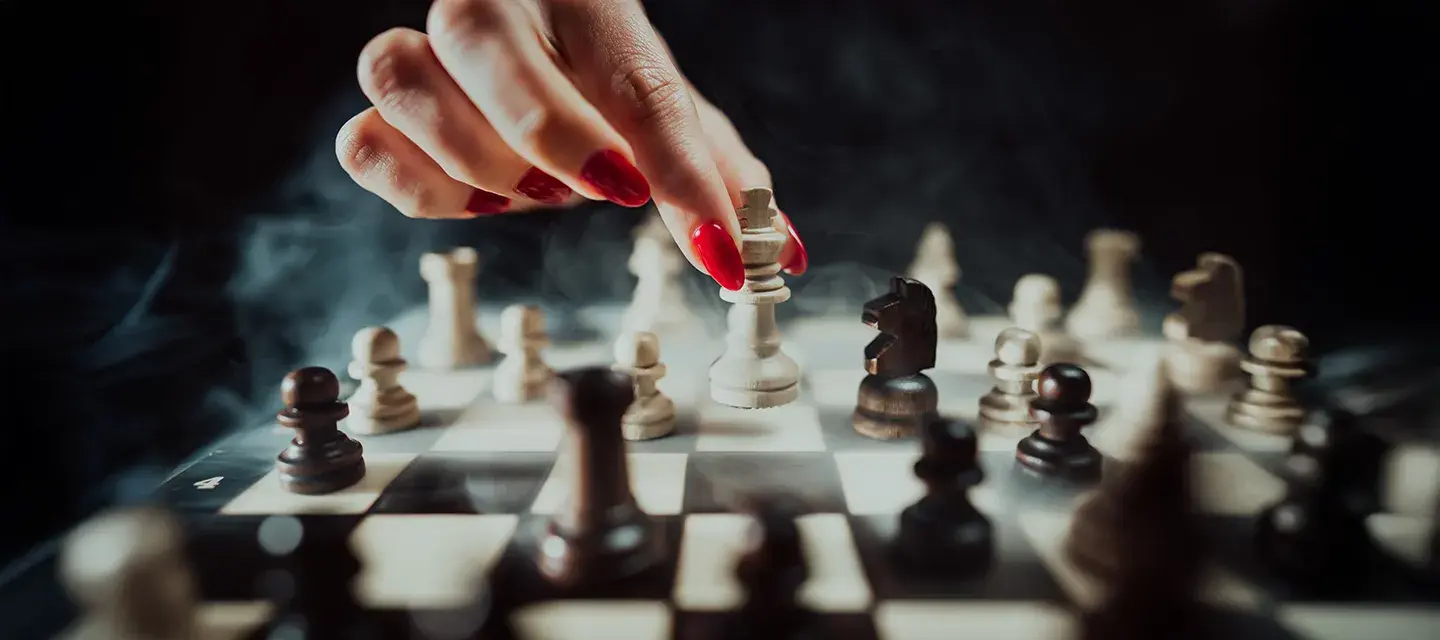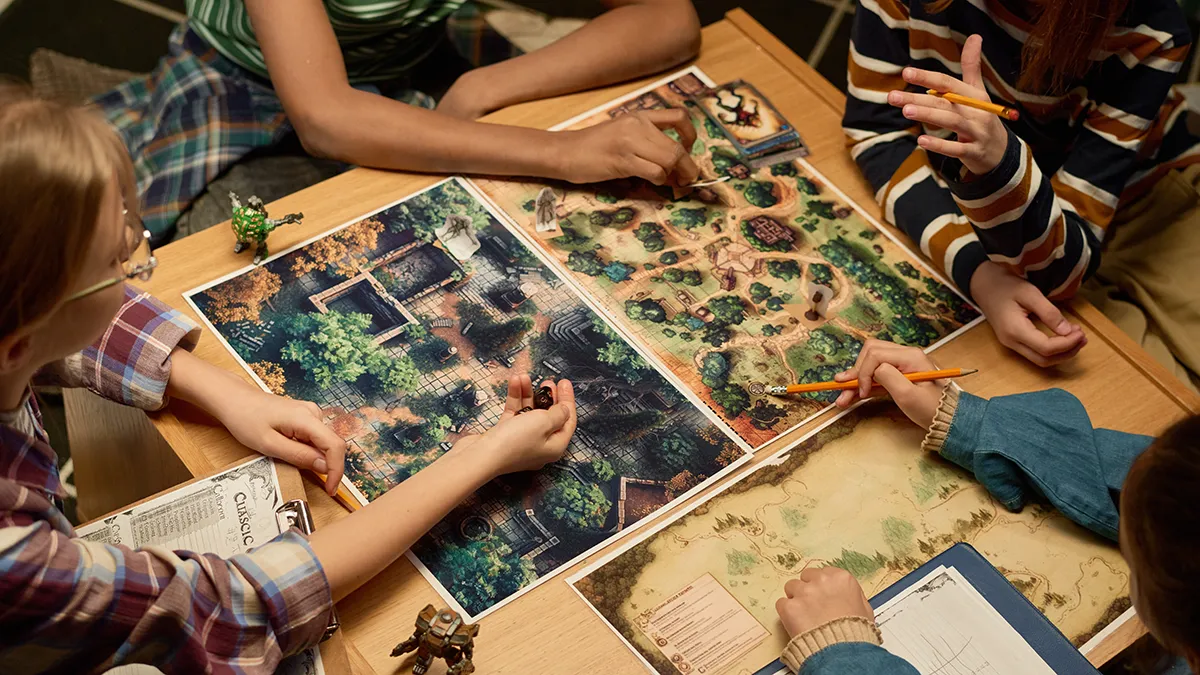9 min read
The Human Side of Game Theory

What is game theory? There was nothing theoretical about putting on your raggedy, old, loose sneakers and running outside, ringing doorbells all over the neighborhood, asking all of the parents (who knew your parents) if your friend could come out and play. The endless summers of childhood were the best, most intuitive days of our lives. We’d spend forever having adventures, building bonds and memories, playing games, and… And creating games that have never existed before. Completely new ones, with rules defined and refined through playing and building upon the game itself, rules developed and agreed upon by the circle of game inventors. We cared about playing fair and reciprocity. This, too, falls under the game theory umbrella.
Game theory is not just a theory of a single game; it’s a mathematical, philosophical, and ethical framework for all possible games we can play, an elaborate systematization of the (presumably rational) logic of choices. It explores many facets a game can have and outlines the strategies we can use. So what is game theory? It is an effort to codify the process of making the best possible choices to maximize your gain and/or the gain of the group, depending on the game's objective. This is what we’ll be exploring today, going through the main concepts of game theory, types of games, a basic classic example, and how game theory translates into the real life of humans. This is a very wide area, and if we only manage to scratch the surface here, lay out the basics, and get you interested, I'll consider our job done. Let’s go.
What Is Game Theory?
An official game theory definition, wearing thick glasses and adjusting its bow tie, states: Game theory is the study of mathematical models of strategic interaction between rational decision-makers. In layman's terms, the fundamental question it asks is “If I make this choice, and you make that choice, what happens to both of us?”. This is the bare brass of it.
So, game theory is a real branch of applied mathematics, using math concepts and tools to understand and analyze real or imagined situations or systems, resting on the idea that the decision makers are rational while making their choice (because you can’t make a stable prediction or analyze volatile irrationality). None of these decision makers has spent a sleepless night with a newborn, is crashing from a sugar high, or is getting off caffeine, nor are they just straddling the hormonal dragon. Jokes aside, game theory isn’t about playing games for fun (the most important postulate of childhood games). It’s about understanding strategy, cooperation, and conflict at the deepest level, as concepts and absolutes. From economics to biology, politics, negotiation, partnerships, and even everyday life, game theory gives us a rational, cold, hard-fact backbone for making sense of complex situations. It helps us understand how multiple individuals (or groups) make decisions that affect one another.
In game theory, the “variables” are not inert numbers, but entities, like people, companies, governments, or even animals, forming more complex systems, and trying to maximize their own outcomes. This is where math becomes so beautifully human, touching on logic and psychology, and fusing structure with unpredictability of the “variables”. In reality, variables are not always rational, but game theory presumes them to be so to make its calculations. So if you want to learn about game theory to be able to lord over all other humans with impeccable logic (not even Picard could do it), your “variables” may throw a curveball and act irrationally. Still, you’re better off knowing game theory core principles than floating through the complex negotiations and decisions of the human experience with no anchor.
Types of Games
1. Cooperative vs. Non-Cooperative
Cooperative games: Players can form agreements or coalitions (such as companies forming a cartel to set prices).
Non-cooperative games: Each player acts individually for its own gain, no binding agreements (two rival firms competing for the same market).
2. Zero-Sum vs. Non-Zero-Sum
Zero-sum games: One player’s gain is another’s loss (chess or poker).
Non-zero-sum games: Players can win or lose together; outcomes aren’t strictly opposites (bilaterally beneficial trade agreements, marriage).
3. Symmetric vs. Asymmetric
Symmetric games: Payoffs depend only on the chosen strategies, not on who plays the game (Prisoner’s Dilemma).
Asymmetric games: Different players have different strategies or payoffs available (negotiations between an employer and employee).
4. Simultaneous vs. Sequential
Simultaneous games: Players make moves at the same time, without knowing what the others chose (sealed-bid auctions).
Sequential games: Players move in turn, knowing the earlier moves (chess).
5. Perfect vs. Imperfect Information
Perfect information games: Every player knows all previous moves (checkers, tic-tac-toe).
Imperfect information games: Some information is hidden (poker, where you don’t know the opponents’ cards).
6. Static vs. Dynamic
Static games: Played once, in a single stage. (also Prisoner’s Dilemma; most situations are mixed type)
Dynamic games: Played over multiple stages, where past moves influence future strategy (repeated negotiations between firms).
7. Discrete vs. Continuous
Discrete games: Finite set of strategies (rock-paper-scissors).
Continuous games: Strategies can take on infinitely many values (setting prices in cents and decimals).
Why Game Theory?
There is no way to opt out of the game. (There is, but it’ll be the only party in your honor you won’t attend, game over). We play games until we leave this Earth. That’s what we do – live, learn, interact, get smarter, and try to do better. Simple games of early childhood and youth quickly evolve into those that teach social skills like reciprocity, trust, or self-interest versus sacrifices for the good of the whole. You’ll have to learn to share your toys in daycare, making it more likely that toys will be shared with you in the future, as you’re entering a long-term repeated game with your classmates, where one selfish gain is not to your benefit. How important is hoarding that fire-truck Tommy, if no one will play with you anymore?

We humans love to seemingly waste time in unproductive pursuits, such as watching movies, yelling at professional athletes on TV, reading all sorts of stories that demand us to suspend disbelief, playing board-games where your gain is nothing more than bragging rights, and listening to failure and success stories from people we’ve never met and may be divided from by the chasm of centuries. We’re not insane (most of the time), nor are we wasting time. We’re observing various aspects of life to learn and master the rules of infinite games that surround us, because the rules and solutions to winning could be overlaid over real situations and can be transferable. Rules and strategies learned in a game of Risk or Monopoly may help you negotiate a better paycheck in your next job interview.
When we’re very young, we just want to win every game. Small children are basically very cute narcissists. Then we learn that there is something to this playing fair thing, so we can get called back to the table to play again, and again, and again. The more you play, the more sophisticated your moves will become. You’ll learn that sometimes a short-term loss is a long-term win. When two rats play (rats are very playful), the larger rat can easily beat the smaller rat as they wrestle. But if the big rat doesn’t let the little rat win at least 30% of the time, the little rat will lose interest in playing. So think of life as an overarching game, the goal of which is to keep on playing indefinitely, and individual wins or losses are far less important than getting to play again. The game, just like the show, must go on.
You can pretty much win and get what you want with all sorts of shady moves if you’ve got no conscience and zero plans on staying put or building relationships where we are. Once the current structure you’re playing within finds out you’re cheating or playing just for personal gain every time, you’ll be shunned and will have to go and find a completely new bunch of suckers to play with, until they too figure you out.
What you’re doing by cheating is breaking the contract of social rules set in place to facilitate a perpetual game. It’s a parasitic existence where you’ll need to go consume somewhere else once you’ve depleted reciprocity and trust here. This might even be something you're ok with, and you may live by the get-while-the-getting-is-good motto. Still, it's missing the point. The goal in life is to keep playing multiple varying games, sacrificing things for a greater cause, and sometimes losing, so you can get a better compound score of all games. You may have to temporarily sacrifice your car and walk to work to be able to buy a house of your dreams later. It is somewhat comforting to know that in real-life scenarios, wins and losses individually don't matter so much and that you shouldn't blame yourself or pat yourself on the back too much. A new game is coming soon.
The possibilities of game theory application are endless, from explaining competition and cooperation between firms and price wars on markets to massive worldwide games of calling a truce or escalating a conflict into war. Every time you’re deciding whose turn it is to wash the dishes or take the kids to the park, you’re basically playing a cooperative, non-zero-sum game. Because you can form agreements both sides will need to abide by, and you can win together because you have clean dishes and a tired kid that will go to sleep soon. You’ve avoided anyone feeling taken for granted, aka a fight brewing, and this will make for a happier relationship. You might even negotiate “paying” your partner for taking your park-turn with a little massage. Hey, the kid is asleep!
Game Theory Example: The 2 Player Game
Far more complicated and nuanced than a chalkboard in some advanced math classroom, life will rarely draw inside the lines. But to help you with an example of game theory, one of the simplest ways to understand it is through a classic, easy, symmetric 2-player game that has two players with exactly the same finite number of choices (discrete type) and the same consequences on each side, but they cannot know what the other has chosen (imperfect information game).
One of the most famous examples concerning bilateral decision-making is the Prisoner’s Dilemma, which roughly goes like this: Two people get arrested and are interrogated separately without a chance to make a plan. Each has two options at their disposal: to betray the other or stay silent. The results of the decisions are:
- If both stay silent, they receive light sentences.
- If one betrays while the other stays silent, the betrayer goes free, and the silent one faces a harsh sentence.
- If both betray, both get moderate sentences.
This is where it gets tricky. Obviously, cooperation and staying silent will give them both the best joint outcome, but neither prisoner knows if they’re being betrayed in the other room (do you see why trust is earned now?). This legitimate doubt means that rational self-interest often leads both prisoners to betray to save themselves, producing a worse result overall, because they’ll both get a longer sentence. A simple demonstration, but it shows the interplay of cooperation and competition, which builds game theory in economics, politics, and social science.
An important concept to mention is also the Nash equilibrium, created by John Nash (for whom he won the Nobel Memorial Prize in Economic Sciences in 1994), so well-portrayed on the silver screen by Mr. Russell Crowe in the movie A Beautiful Mind. A simple explanation of Nash equilibrium is that each player chooses the best possible strategy, given what the other players are doing, and an important element is that no one can improve their outcome by changing their choice alone.
Demonstrated in this Prisoner's Dilemma, the Nash equilibrium would be achieved if both betray, because:
- If one betrays, the other’s best move is also to betray, not to get the longest sentence.
- Neither of the prisoners can improve their outcome by switching to silence on their own. Both need to change to get the minimum sentence.
Final Thoughts
So, what is game theory? A tool for mathematicising the decision-making process in humans, animals, and computer models alike. It serves as a lens to see global, private, and business interactions more clearly and helps make sense of strategies. Seemingly separate individual games, curdle together, bonded by the same logic. Game theory will outline the games, the objectives, and how to become most efficient and sustainable in hitting these objectives. Sometimes a win is important, but most of the time it is really not about winning, but about playing smart across the board with the resources you have.
Feel free to explore game theory further, and we hope you’ll learn enough to help you navigate logical lateral or up movements through life. And perhaps the most empowering truth here is this: once you learn the rules of the game, you can make wiser decisions, ideally not only for your own benefit, but for the benefit of all. Stay curious, stay beautiful, and play well.




Leave a comment